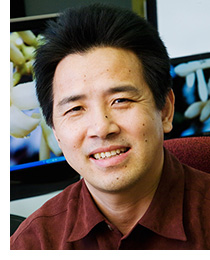Genomics and Biotechnology for Global Food Security
Ray Ming, Department of Plant Biology, University of Illinois at Urbana-Champaign
 Abstract: The rising world population makes global food security a high priority. Application of genomics and biotechnology accelerate trait-genotype association discoveries and crop improvement. Tropical fruit crop papaya will be used to demonstrate how genomic technologies are applied to address a biological and production problem that has lasted 4,000 years since hermaphrodite papaya was selected during the domestication process. Papaya is a trioecious species with three sex forms: male, female, and hermaphrodite. There is no true breeding hermaphrodite papaya, and seeds from self-pollinated hermaphrodite fruit segregate 2 hermaphrodite : 1 female. Hybrid seeds produced from crosses between female and hermaphrodite segregate 1 hermaphrodite to 1 female. Commercial papaya production requires planting multiple seedlings to ensure at least one hermaphrodite per hill. Genetic mapping and genome sequencing revealed that sex in papaya is controlled by a pair of nascent sex chromosomes with two slightly different Y chromosomes that distinguish males (XY) and hermaphrodites (XYh). The papaya genome and three sex chromosomes have been sequenced. The gene controlling flesh color was identified and DNA markers linked to this trait was developed for marker assisted selection. Male and hermaphrodite specific DNA markers have been developed for testing sex types at the seedling stage. Engineering true breeding hermaphrodite varieties is underway, which will eliminate planting multiple seedlings that has been practiced since the domestication of hermaphrodite papaya in Central America. The advancement of genomic technologies, artificial intelligence, and machine learning will result in more efficient food production to meet the need.
Abstract: The rising world population makes global food security a high priority. Application of genomics and biotechnology accelerate trait-genotype association discoveries and crop improvement. Tropical fruit crop papaya will be used to demonstrate how genomic technologies are applied to address a biological and production problem that has lasted 4,000 years since hermaphrodite papaya was selected during the domestication process. Papaya is a trioecious species with three sex forms: male, female, and hermaphrodite. There is no true breeding hermaphrodite papaya, and seeds from self-pollinated hermaphrodite fruit segregate 2 hermaphrodite : 1 female. Hybrid seeds produced from crosses between female and hermaphrodite segregate 1 hermaphrodite to 1 female. Commercial papaya production requires planting multiple seedlings to ensure at least one hermaphrodite per hill. Genetic mapping and genome sequencing revealed that sex in papaya is controlled by a pair of nascent sex chromosomes with two slightly different Y chromosomes that distinguish males (XY) and hermaphrodites (XYh). The papaya genome and three sex chromosomes have been sequenced. The gene controlling flesh color was identified and DNA markers linked to this trait was developed for marker assisted selection. Male and hermaphrodite specific DNA markers have been developed for testing sex types at the seedling stage. Engineering true breeding hermaphrodite varieties is underway, which will eliminate planting multiple seedlings that has been practiced since the domestication of hermaphrodite papaya in Central America. The advancement of genomic technologies, artificial intelligence, and machine learning will result in more efficient food production to meet the need.
Bio: Ming obtained his Ph.D. at the University of Hawaii in 1995, under the supervision of Dr. James Brewbaker. He did post-doctoral research with Dr. Andrew Paterson at Texas A&M University. He was appointed as a Plant Molecular Geneticist at the Hawaii Agriculture Research Center working on tropical plant genomics including papaya, sugarcane, and pineapple in his research program. He is currently a professor of plant biology at the University of Illinois at Urbana-Champaign. His research interests include studying sex chromosomes and sex determination in papaya, the evolution of CAM photosynthesis in pineapple, and exploring genome evolution in allopolyploid coffee and autopolyploid sugarcane.
